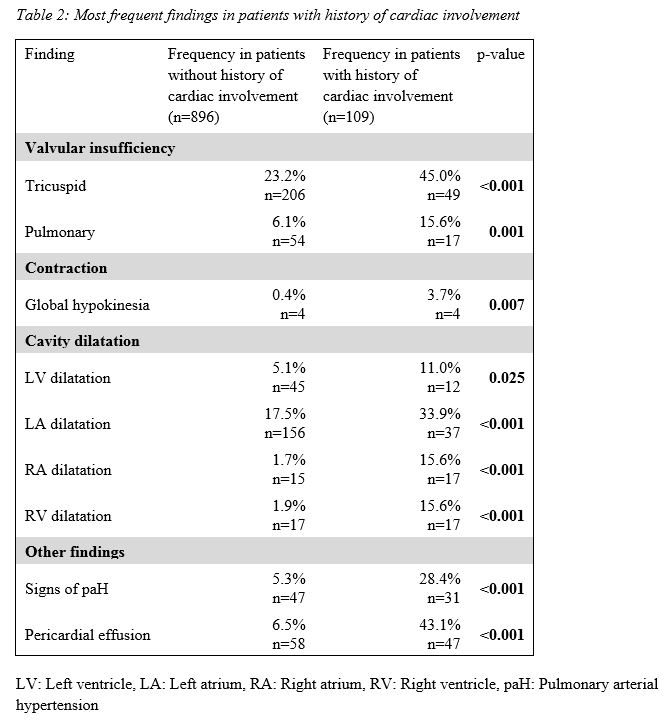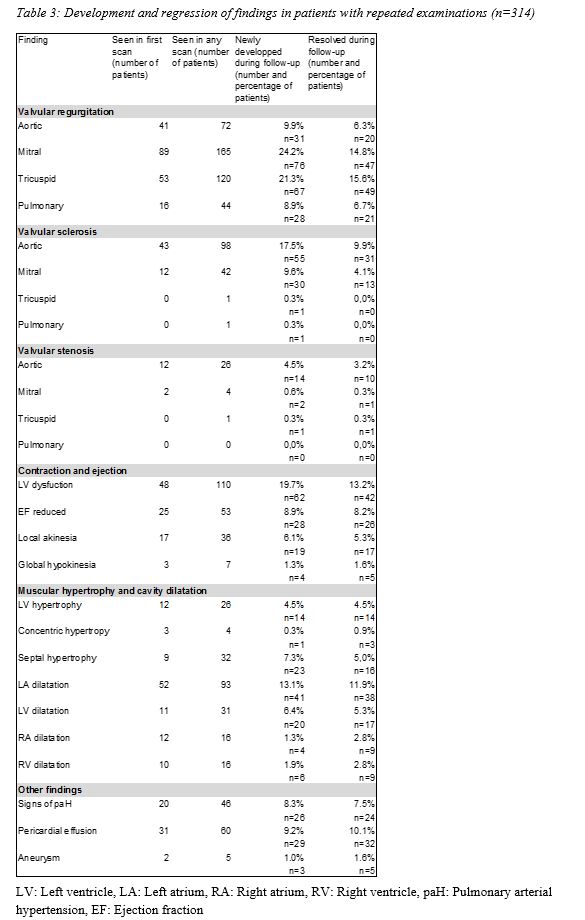Session Information
Session Type: ACR Poster Session A
Session Time: 9:00AM-11:00AM
Background/Purpose: Echocardiography is frequently performed in patients with connective tissue diseases (CTD), mostly to evaluate cardiac involvement or development of pulmonary arterial hypertension (paH). Despite the application as part of routine clinical follow-up, there is incomplete data for the range and frequency of findings in different CTD.
Methods: We included all consecutive patients from a tertiary rheumatological referral center with CTD diagnosis and echocardiographic examination between January 1st 2006 and December 31st 2015 by retrospective chart review. For each echocardiographic finding, the proportion of patients per diagnosis with a pathological result in at least one examination was calculated. Further, each finding´s frequency in patients with and without previously documented inflammatory cardiac involvement was compared. For patients with more than one visit, we recorded how often findings developed or resolved over time.
Results: 1004 patients with different CTD and a total of 1660 performed echocardiographies were identified. Table 1 displays the frequency of findings in the whole cohort and for each CTD, respectively. The most common findings were mitral, aortic and tricuspid regurgitation, aortic valve sclerosis, left ventricular dysfunction, and left atrial dilatation. Table 2 shows which findings were significantly more common in patients with a history of inflammatory cardiac involvement (n=109). 314 patients had consecutive examinations; medium interval between first and last examination was 40 months (SD: 28, range: 0.9-115). Development and regression of findings during follow-up are given in table 3. Mitral (24%) or tricuspid regurgitation (21%), aortic valve sclerosis (18%) and left ventricular dysfunction (20%) most commonly developed.
Conclusion: This study is the first to report echocardiographic findings in a large cohort of different CTD. Abnormal findings are common in all disease entities. Some pathological findings are more common in patients having suffered from cardiac involvement, these seem to be disease-related. In follow-up, a change of findings was frequently observed. These results support the role of echocardiography for routine examination and in follow-up in patients with CTD.
To cite this abstract in AMA style:
Schäfer VS, Weiss K, Krause A, Schmidt WA. Prevalence of Echocardiographic Findings in Connective Tissue Diseases – a Retrospective Cohort Study [abstract]. Arthritis Rheumatol. 2017; 69 (suppl 10). https://acrabstracts.org/abstract/prevalence-of-echocardiographic-findings-in-connective-tissue-diseases-a-retrospective-cohort-study/. Accessed .« Back to 2017 ACR/ARHP Annual Meeting
ACR Meeting Abstracts - https://acrabstracts.org/abstract/prevalence-of-echocardiographic-findings-in-connective-tissue-diseases-a-retrospective-cohort-study/



